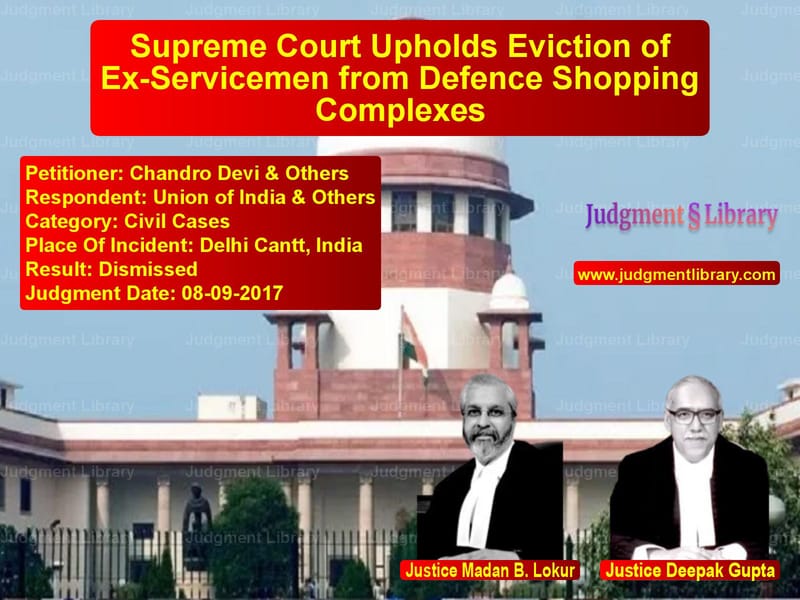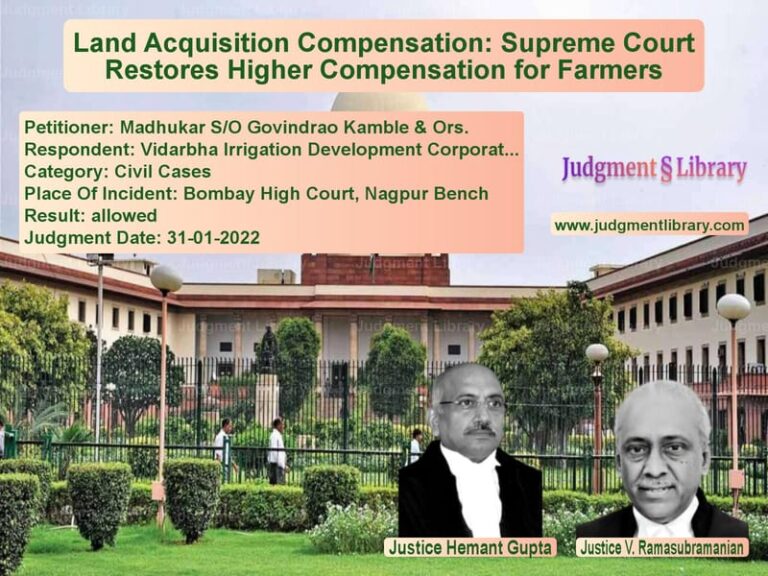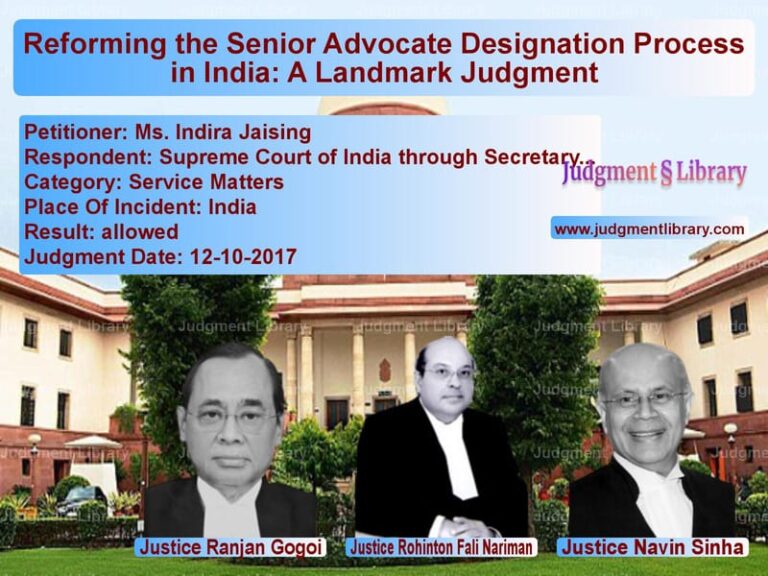Supreme Court Upholds Eviction of Ex-Servicemen from Defence Shopping Complexes
The case of Chandro Devi & Others vs. Union of India & Others revolves around the eviction of ex-servicemen and their family members from defence shopping complexes. The Supreme Court was called upon to decide whether these occupants had a legal right to continue in possession despite the expiry of their lease agreements. The Court upheld the eviction, reinforcing that lease agreements cannot confer perpetual rights.
Background of the Case
A group of petitioners, including ex-servicemen and widows of deceased defence personnel, had been allocated shops in defence shopping complexes managed by the Station Commander. These shops were located in areas like S.P. Marg, Delhi Cantt., Arjun Vihar, Dhaula Kuan, and Shankar Vihar.
The petitioners were granted leases for an initial period of 11 months, with a provision for renewal. However, on April 13, 2007, a new policy was introduced, limiting lease tenure to a maximum of five years. The policy also mandated that after completing five years, lessees would have to vacate the premises but could reapply for a fresh lease after a gap of three years.
The leases of the petitioners were canceled as they had exceeded the five-year limit. They challenged this decision before the Delhi High Court, which dismissed their claims. A Letters Patent Appeal (LPA) was also dismissed on July 29, 2010. Some petitioners, including Chandro Devi, did not approach the Supreme Court initially. Later, they filed review petitions, which were also dismissed, leading to the present appeal.
Legal Issues in the Case
- Whether the petitioners had a legal right to renewal of their leases beyond the five-year limit.
- Whether the new policy limiting leases to five years was arbitrary or discriminatory.
- Whether the government’s decision to evict the petitioners was legally valid.
Arguments of the Petitioners (Chandro Devi & Others)
- The petitioners argued that their leases had been renewed multiple times in the past, creating a legitimate expectation of continued renewal.
- The new policy limiting leases to five years was unfair and discriminatory, as some tenants were allegedly allowed to continue beyond this limit.
- The petitioners contended that they had invested significant amounts in developing these shops and that eviction would cause financial hardship.
- They claimed that a letter dated September 4, 2008, which formed the basis of the eviction decision, was a Draft Government Letter (DGL) and not an official policy document.
Arguments of the Respondents (Union of India)
- The government argued that the leases were always intended to be temporary and did not confer any long-term rights.
- The new policy was introduced to ensure that more ex-servicemen and their families could benefit from the scheme.
- The policy applied uniformly to all lessees, and there was no evidence of discriminatory treatment.
- The petitioners had no vested right to renewal beyond the stipulated five-year period.
Supreme Court’s Observations
The Supreme Court examined the relevant policies and legal principles governing lease agreements. The Court made the following key observations:
- The lease agreements were clear in stating that they were for a fixed term and subject to renewal at the discretion of the Station Commander.
- The policy introduced in 2007 applied to all lessees, ensuring uniformity and fairness.
- There was no evidence that the government had made any specific representation assuring perpetual renewal of leases.
- The petitioners’ claim of legitimate expectation was unfounded, as no legally enforceable promise had been made.
- The Draft Government Letter (DGL) of September 4, 2008, was not the sole basis of the eviction decision. Even if it were ignored, the policy of 2007 remained valid.
The Court stated:
“The mere fact that leases had been renewed in the past does not create a legal right to perpetual renewal. The policy decision limiting leases to five years is neither arbitrary nor unreasonable.”
Final Ruling
The Supreme Court dismissed the appeal and upheld the eviction order. The key directives included:
- The petitioners had no legal right to remain in the shops beyond the five-year lease period.
- The government’s decision to enforce the new policy was valid and binding.
- All remaining lessees were directed to vacate the premises immediately.
- The appeal was dismissed with no relief granted to the petitioners.
Conclusion
This judgment reinforces the principle that government leases are subject to policy changes and do not confer perpetual rights. It also clarifies that legitimate expectation must be based on a clear legal commitment, not on past practices. The ruling serves as a precedent for future disputes involving lease agreements and government policies.
Don’t miss out on the full details! Download the complete judgment in PDF format below and gain valuable insights instantly!
Download Judgment: Chandro Devi & Other vs Union of India & Oth Supreme Court of India Judgment Dated 08-09-2017.pdf
Direct Downlaod Judgment: Direct downlaod this Judgment
See all petitions in Property Disputes
See all petitions in Specific Performance
See all petitions in Damages and Compensation
See all petitions in Judgment by Madan B. Lokur
See all petitions in Judgment by Deepak Gupta
See all petitions in dismissed
See all petitions in supreme court of India judgments September 2017
See all petitions in 2017 judgments
See all posts in Civil Cases Category
See all allowed petitions in Civil Cases Category
See all Dismissed petitions in Civil Cases Category
See all partially allowed petitions in Civil Cases Category







